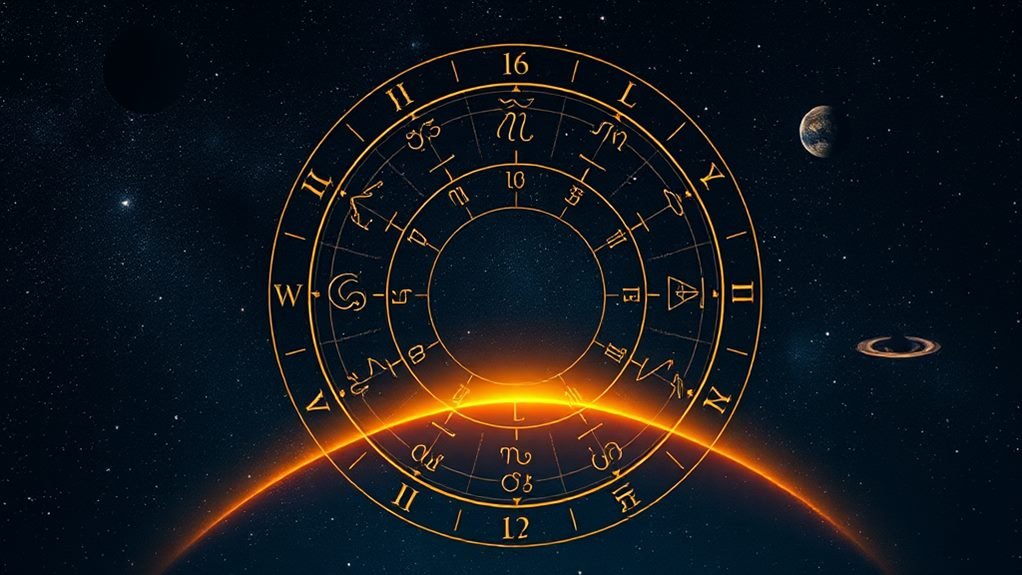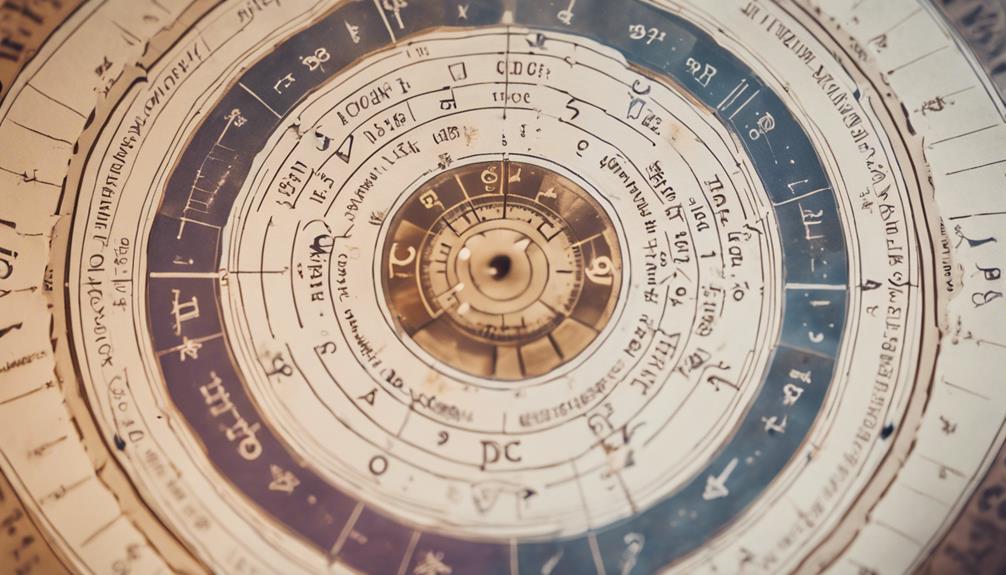What Is A Composite Chart Astrology
A Composite Chart in astrology serves as a sophisticated analytical tool, merging the birth charts of two individuals to illuminate the intricacies of their relationship dynamics. By focusing on midpoints and planetary alignments, this chart unveils the composite strengths, challenges, and unique interaction patterns within a partnership. Whether applied to personal or professional connections, the insights garnered from a Composite Chart can significantly enhance mutual understanding and cooperation. But how exactly are these charts constructed, and what specific aspects do they highlight?
Key Takeaways
- Composite charts combine two individuals' birth charts to analyze relationship dynamics.
- They reveal the strengths, weaknesses, and communication styles within the relationship.
- The midpoints of planets are calculated to create a composite chart.
- Composite charts highlight areas of harmony, potential conflict, and mutual growth.
- They are used in both personal and professional relationship assessments.
Understanding Composite Charts

Composite charts in astrology offer a unique method for examining the dynamics and compatibility within relationships by combining the birth charts of two individuals. This technique provides a holistic view of relationship dynamics, potential, purpose, challenges, and compatibility.
By superimposing the midpoints of planets from both charts, a composite chart reveals the strengths, weaknesses, growth areas, interaction patterns, and communication styles within the relationship. It serves as a valuable tool for understanding shared goals, pinpointing compatibility issues, and identifying potential challenges.
The insights derived from composite charts help in navigating relationship dynamics effectively, offering a deeper comprehension of how individuals interact and grow together in various contexts, from personal relationships to professional partnerships.
Constructing a Composite Chart
To construct a composite chart, begin by collecting the precise birth data, including dates, times, and locations, for both individuals involved. Ensure the birth times are converted to Coordinated Universal Time (UTC) to maintain accuracy.
Next, calculate the midpoints for each planet and key astrological point from both charts. This involves averaging the positions of corresponding planets to determine their midpoint locations. Utilize specialized astrology software to facilitate this process and generate an accurate composite chart.
The resulting chart will depict the relationship's overall energy and dynamics by highlighting combined planetary influences. This foundational step is crucial for gaining deeper insights into the relational patterns and potentialities shared by the individuals.
Interpreting Composite Charts

Interpreting composite charts involves analyzing the midpoints and aspects to uncover the relationship's core dynamics, strengths, and potential challenges. Key aspects such as conjunctions, oppositions, and squares reveal significant areas of harmony or tension.
The composite Sun symbolizes the relationship's overall purpose, while the Moon points to emotional needs and shared feelings. Understanding the placement of Venus and Mars highlights romantic and sexual dynamics.
Analyzing the composite chart's house placements provides insights into how the relationship manifests in different life areas. Additionally, the composite Ascendant reflects the relationship's outward expression.
A thorough interpretation requires an integrated view of these elements to offer a comprehensive understanding of the relationship's unique characteristics and potential growth opportunities.
Practical Applications
In practical applications, composite charts serve as valuable tools for analyzing relationship dynamics in both personal and professional contexts. By synthesizing the birth charts of two individuals, composite charts reveal the core essence of their interaction, highlighting areas of harmony and potential conflict.
These charts are instrumental in understanding shared goals, decision-making processes, and communication styles within relationships. In the workplace, composite charts can be utilized to assess team compatibility, optimize collaboration, and enhance leadership dynamics.
For personal relationships, they provide insights into mutual growth opportunities, emotional connection, and long-term compatibility. Overall, composite charts offer a nuanced perspective that supports deeper understanding and effective navigation of relational intricacies.
Real-Life Examples

By examining real-life examples, we can better understand how composite charts provide valuable insights into relationship dynamics and compatibility.
For instance, Sarah and Tom, whose individual birth charts reveal contrasting personalities, find common ground through their composite chart, highlighting their mutual strengths and weaknesses.
Similarly, Laura and James, a couple navigating long-distance challenges, discover through their composite chart that their shared purpose lies in mutual growth and communication.
In the business realm, CEOs often use composite charts to identify synergistic partnerships, enhancing team dynamics and achieving corporate goals.
These examples illustrate the practical application of composite charts in understanding and improving personal and professional relationships, showcasing their effectiveness in revealing deeper relational insights.
Limitations and Critiques
While composite charts offer valuable insights into relationship dynamics, they also present certain limitations and critiques that merit consideration.
One primary critique is the subjectivity in interpretations, which can vary significantly among astrologers. The accuracy of birth times is crucial; even slight discrepancies can affect the chart's reliability.
Additionally, composite charts primarily focus on the relationship, potentially overlooking individual nuances and personal growth. This relationship-centric view might miss individual aspirations and desires.
Some astrologers argue that transits in composite charts reflect external events more than internal dynamics, thereby limiting their effectiveness.
Composite Vs. Birth Charts

Understanding the distinctions between composite charts and individual birth charts is essential for a comprehensive analysis of relationship dynamics and personal growth. Individual birth charts focus on a person's unique traits, life path, and inherent potentials. In contrast, composite charts synthesize the midpoints of planetary placements from two individuals' charts to reveal relationship dynamics, shared goals, and compatibility. While individual charts highlight personal strengths and challenges, composite charts provide insights into the interaction patterns and communication styles between partners.
| Aspect | Individual Birth Chart | Composite Chart |
|---|---|---|
| Focus | Personal traits and life path | Relationship dynamics and compatibility |
| Calculation Method | Based on birth data | Midpoints of both individuals' charts |
| Purpose | Personal growth and insights | Understanding shared dynamics |
| Interpretation | Individual strengths/challenges | Interaction and compatibility |
Conclusion
In essence, the Composite Chart serves as a celestial mirror reflecting the intricate dynamics of relationships, providing invaluable insights into shared goals and emotional bonds.
As a synthesis of individual birth charts, it unveils the strengths and potential growth areas within any partnership.
While not without limitations, its holistic perspective enriches the understanding of relational interactions, making it an indispensable tool for fostering deeper connections, both personal and professional.
Thus, the Composite Chart stands as a testament to the profound interconnectedness of human relationships.
🔴 Need Clarity on your Situation?



